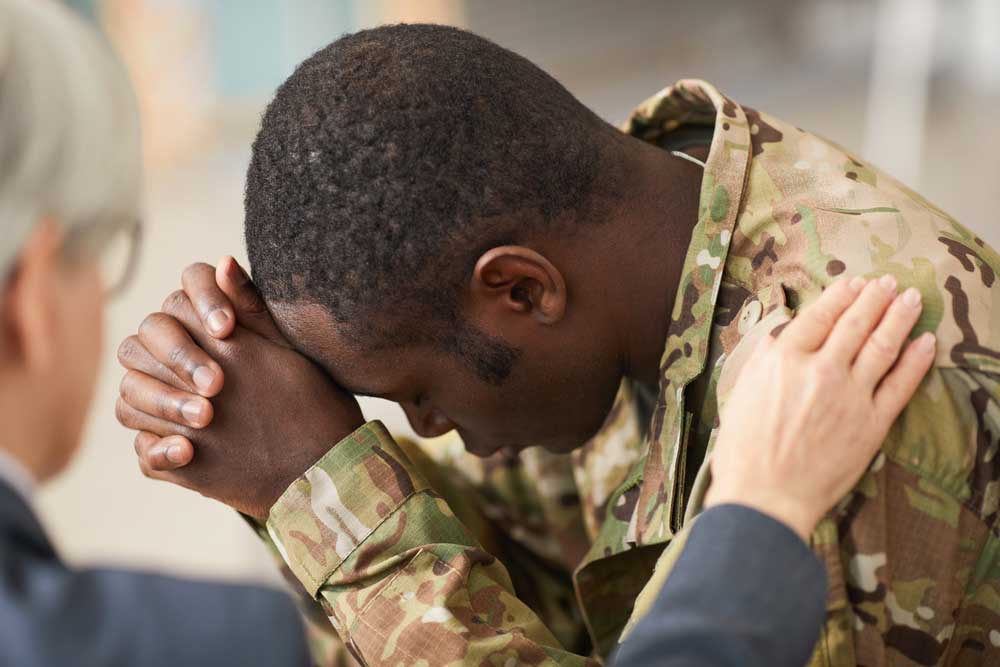When it comes to war, most people would probably agree that they do not understand what it is really like. Only those who have lived it and came out alive on the other side know and feel the chilling memories of first-hand experiences of deployment into a combat zone. Family members and close friends experience a different kind of pain as they watch their loved ones deal with post-war trauma. The tragedies that come along with working in a warzone can haunt veterans for years and cause them long-term mental and physical pain. Whether you were in the Army, Navy, Marine Corps, Air Force, or Coast Guard, your indispensable service requires not only thanks but effective and wholesome treatment if you are suffering from subsequent physical and psychological discomfort. Luckily, there are ways to manage these issues and programs designed to help you recover.
Common Illnesses Vets Experience
Over two million American soldiers were deployed over the last decade. Depending on their branch and personal experiences, there are some different illnesses they may encounter. For example, veterans commonly report physical conditions like:
- Lost limbs
- Tinnitus and/or hearing loss
- Shrapnel and gunshot wounds
- Traumatic Brain Injuries (TBIs)
Severe stress from disturbing experiences can also lead to substance use disorder and/or mental health problems like anxiety, depression, schizophrenia, bipolar, and post-traumatic stress disorder (PTSD). The risk of developing co-occurring conditions and attempting suicide are also major concerns. In fact, in 2018, over 1.7 million Veterans got mental health treatment in a VA specialty program. Similarly, a 2016 study published in the American Journal of Public Health found that over 1.1 million Veterans treated between 2010–2011 were diagnosed with at least one of the following disorders: substance use disorder, anxiety, schizophrenia, bipolar disorder, and PTSD.
PTSD: A Leading Condition Among Vets
It may come as no surprise that PTSD is one of the leading disorders among military personnel. According to the U.S. Department of Veteran Affairs, this challenging condition is characterized by four main symptoms:
#1 Reliving the terrifying event at any moment and being triggered by sounds and situations. You might experience nightmares or flashbacks.
#2 Avoiding people, places, or things that remind you of the event (i.e. avoiding crowds, driving, certain movies).
#3 Experiencing increased negative thoughts and/or feelings (i.e. feeling numb or guilty, losing interest in old hobbies and loved ones, and thinking that the world is too dangerous and people can not be trusted)
#4 Being hyper-aroused or in a constant state of fight-or-flight. As a result, you may experience insomnia, difficulty concentrating, sudden anger or irritability, and become startled by a loud noise or surprise.
According to a JAMA Psychiatry study from 2014, the rate of PTSD among veterans is 15 times higher than that of the civilian population. The percentage of veterans suffering from PTSD also varies by service era. For example, it is estimated that approximately 20% of veterans who served in the Gulf War (Desert Storm) had PTSD in a given year. Similarly, 11-20% of those who served more recently in Operations Iraqi Freedom (OIF) or Enduring Freedom (OEF) experienced PTSD.
What Trauma Does to the Brain
Intrusive thoughts, nightmares, hyperarousal, flashbacks, sleep disturbances, and changes in memory, concentration, and startle responses are all related to how trauma alters brain function. Severe stress can cause long-term changes in brain circuits that regulate responses to stress, thus making future responses abnormal or irrational. The main parts of the brain associated with stress responses include the hippocampus, amygdala, and medial prefrontal cortex.
The hippocampus is central to emotions, learning, and memory formation, while the amygdala is involved in processing fearful and threatening stimuli. Similarly, the medial prefrontal cortex modulates aversive learning and memory. Cortisol, the primary stress hormone that mediates fear-related behaviors, and norepinephrine, another hormone that increases heart rate and blood pressure, are both central to the brain’s stress response.
Across numerous studies examining various types of PTSD patients including Vietnam and other combat veterans, varying degrees of reduced hippocampal volume were discovered. The researchers hypothesize that “stress-induced hippocampal dysfunction may mediate many of the symptoms of PTSD which are related to memory dysregulation, including both explicit memory deficits as well as fragmentation of memory…” They also found that amygdala function increased while medial prefrontal cortex function decreased. Patients with PTSD also demonstrated increased cortisol and norepinephrine in response to stress, which can harm the body over time.
Active military personnel and veterans live a life far different from most Americans. They have put their life on the line to protect our country, a service that often comes at a great cost to their health. Depression, anxiety, bipolar disorder, and schizophrenia are common mental conditions among soldiers. PTSD, in particular, can cause paralyzing flashbacks and nightmares that turn civilian life into a battlefield. Trauma alters regions of the brain central to healthy stress and fear responses. There is no shame in getting help and truth be told, it is the least we can do. At Achieve Concierge, it is our honor to assist you in recovering. We understand that trauma, whether it grows into PTSD or another disorder, doesn’t wait until you are in front of your therapist. It can hit at any time and that is why we offer same-day and next-day appointments. We’re here to help you, call (619) 393-5871.



